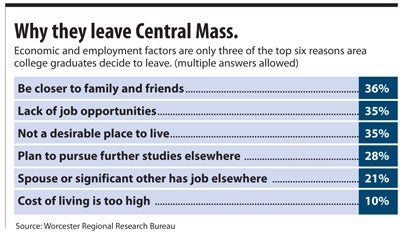Central Massachusetts stakeholders are taking a hard look at how to woo more new graduates to stay awhile after they graduate from Worcester-area colleges and universities.
According to the Central Massachusetts Talent Retention Project, a survey published by the Worcester Regional Research Bureau in August, 33 percent of those who received their degrees in 2014 planned to live in Central Massachusetts after finishing school. Of those, 18 percent said they would live in Worcester, while 15 percent said they would live elsewhere in Central Massachusetts. Meanwhile, 23 percent prefer living closer to Boston.
Those numbers don’t exactly bode well for Worcester, where city leaders are vying to attract young urban professionals to a transforming downtown to live, work and enjoy their leisure time. But they aren’t terrible, considering that Greater Worcester, and Massachusetts, draw a disproportionately large number of students from out of state, compared with other economically competitive states, such as Pennsylvania, North Carolina and New York.
Tim McGourthy, executive director of the Worcester Regional Research Bureau, recognizes this as an obstacle to talent retention, noting that students often return to their home states after they graduate. But he thinks Greater Worcester could capture a greater percentage of new graduates as residents.
“There’s more we can do,” McGourthy said. “(In the survey summery,) we point out the need to connect students with the jobs that are here.”
Young grads are practical
Atop all factors, from atmosphere to proximity to friends and family, Worcester-area grads cited long-term job prospects as “extremely important” in determining where they live. On that front, the city is up against big competition, especially when it comes to retaining students who want to work at large companies in such fields as finance, equities and large-scale logistics, McGourthy said.
“There are opportunities here, but there are also opportunities in Boston and New York,” McGourthy said.
Still, Worcester is home to major companies such as Unum and Hanover Insurance, as well as health care providers and a host of biotechnology startups. Nonprofit organizations and the large collection of colleges and universities are also major contributors to the area economy, presenting a variety of job opportunities.
Greater Worcester also enjoys a close proximity to the Interstate-495 corridor and MetroWest, where many technology and life sciences companies are growing. That opens up another job market for graduates, who could reasonably live in and around Worcester and commute east to work.
McGourthy noted that housing affordability is an important incentive to attract young professionals, and efforts to make the city an even more attractive place to live are crucial in boosting retention. Those include cultural events and programs, such as the WOO Card program, which grants cardholders discounts at Worcester cultural destinations. Planners are also evaluating transportation available to college students — since the schools are spread throughout Worcester — to make them more likely to venture into the city for fun.
“(These programs) are bringing them in, but we’re hoping downtown redevelopment will continue to foster the connection,” said McGourthy, who highlighted recent development progress toward a downtown theater district as one harbinger of increased downtown activity.
Fostering workplace connections
But since job prospects top the list of factors that determine where graduates live, it may be even more important to shore up the connection between area employers and young professionals entering the workforce. Karen Pelletier, director of higher education-business partnerships at the Worcester Regional Chamber of Commerce, was hired last spring to spearhead that effort.
Pelletier said working with area businesses to create internship opportunities for students is important in building a bridge between students and the workplace. Since joining the chamber, Pelletier has launched an internship database for Central Massachusetts and helped found a committee of career services professionals from local schools to aid in the coordination of employer visits for students.
Catering to young entrepreneurs is another piece of the strategy, Pelletier said. She’s working with local entrepreneurial faculty to identify students eligible for chamber-sponsored membership with Running Start, an incubator in Gateway Park.
Pelletier said that would help make Worcester “the place they want to start their business … (so young entrepreneurs) are not moving home and living in their parents’ basement, not moving to Boston and being part of the clutter there.”
When it comes to connecting businesses to the workforce, Pelletier said employers often find it a challenge. Some high-profile local companies do it well, while others find it cumbersome, she said.
Nicole DiOrio, director of career development and the internship center at Assumption College in Worcester, believes the city offers students plenty of work opportunities in certain sectors. For example, nonprofits have historically drawn many Assumption graduates.
“I think students are seeking the right opportunity and are somewhat flexible about the location,” DiOrio said, though she noted that students who want to work at big businesses usually look to larger cities for their first jobs.
Getting to know companies
At an Oct. 30 panel discussion on talent retention sponsored by the WRRB, DiOrio highlighted students’ lack of familiarity with Worcester-area companies as one obstacle to retention. She said that disconnect may make it difficult for some students to identify strong job opportunities.
Steve Joseph, a senior vice president at Unum, echoed DiOrio’s comments in an interview last week. He said students have become more aware of Unum as a potential employer since the company’s Worcester office was relocated downtown to CitySquare, where it’s visible from the highway.

